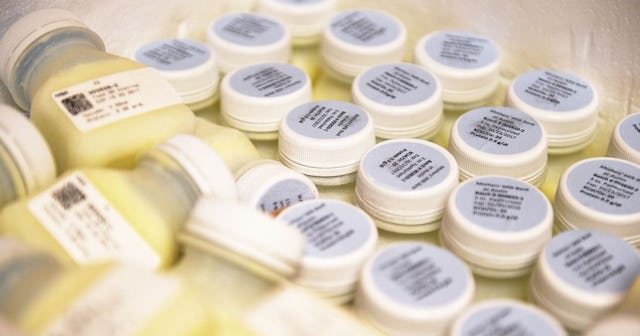Don't Freak Out About Donor Breast Milk

If you’ve ever had a baby who struggles with formula when your breast milk supply is also struggling, you already know the sheer hell of what that’s like. You know how much you’d do anything to take that pain and discomfort away from your little one.
After we made the switch to formula, my twins seriously struggled to digest this new change. They’d grunt, push and scream, and they’d grunt while they pushed and screamed. They were miserable and I felt helpless… not to mention, incredibly guilty.
Choosing to stop nursing was partially my idea, and partially due to my twins’ early arrival and their inability to properly maintain a good latch. I couldn’t keep up a consistent pumping schedule while meeting the demands of two newborns, and it caused my supply to suffer… rendering me a blubbering, guilty mess with all-of-the-mom-feels because of it.
We tried everything — switching formula brands, soy formula, gas drops, gripe water, etc. — you name it, and we tried it. It didn’t help, and I couldn’t help, and I was left mentally berating myself for giving up breastfeeding when I knew their horrid tummy troubles stemmed from the formula I chose to feed them. As most moms irrationally feel when making the switch from breast milk to formula, I felt like a failure.
Then my husband’s aunt told us about a Facebook group called Eats On Feets where nursing mothers come together to help moms struggling to breastfeed provide breast milk for their infants. With my pediatrician’s approval, I posted in my local Eats On Feets group and expressed my need for some liquid gold. Let’s just say, I was equally astounded and touched by the flood of notifications from loving, nursing mothers who were eager to help me and my babies.
My husband and I provided the nursing moms who donated their milk with replacement bags, and we left the transaction with a huge stash of breast milk for the deep freezer and all of the good-feels and relief in our hearts.
One of the moms even added an extra pumping session into her day so she could continually help to accommodate my twins’ breast milk demands. I insisted that she didn’t need to, as I already know how difficult it can be to pump with an already nursing little one, but she insisted. She really wanted to do this for me — for my children who she didn’t even know. And THAT is the heart of a truly caring mother. I am grateful for her to this day.
But still, there will always be those who question your parenting, even when you feel you’ve made the right decision for your family. When those closest to me got wind of how I was feeding my babies, I was more than ridiculed and shamed. Words like “danger,” “disgusting,” and “I would never feed them that,” flew from the mouths of those I loved most dearly.
And yet, I stuck with our informed breast milk sharing. With my pediatrician’s approval.
Kara Kaikini, childbirth education and lactation manager at Maine Medical Center works in the milk room, which consists of donated breast milk that is pasturized before being prepared and frozen for mothers who may need it.
Portland Press Herald/Getty
Megan O’Neill, director of lactation support, lifts a bag of frozen donated breast milk from the freezer.
Pat Greenhouse/The Boston Glob/Getty
I’m clearly grateful formula is an option, but science supports the many longterm benefits of breast milk. It’s a scientific fact, not an opinion, that breast milk is rich in antibodies, and it contains the exact, proper amount of nutrition needed for optimal growth for babies under one year. And as for the personal benefits for my family, breast milk proved way easier for my little ones’ guts to digest. Their digestive discomfort was quickly remedied and they were far more comfortable overall.
Of course, there are plenty of reasons why choosing formula may be the better option for a mom, baby or family. I chose to stop breastfeeding myself, but that doesn’t erase the benefits of breastmilk.
Anytime milk is used from someone who is not a baby’s biological mother, there will always be small risks. Whereas donor milk from a hospital or milk bank is pasteurized to kill off any possible bacteria, receiving donor milk from another mother is not. To use informed donor breast milk is to value the benefits of breast milk over the very small risk of possible disease transfer. And since I knew the mothers who donated their breastmilk, it was a risk I was willing to take for my family.
Megan O’Neill, director of lactation support, lifts a bag of frozen donated breast milk from the freezer.
Pat Greenhouse/The Boston Glob/Getty
Milk banks struggle to maintain enough donated breast milk. Therefore, the milk they do have is usually given to the most medically fragile babies in the NICU as a means to help them thrive. So moms are adapting their own community-driven ways to feed their babies breast milk from donor sources. And according to the Eats On Feets website, there have been no documented cases of disease transmission or bacterial infection associated with informed breast milk sharing.
I’ve seen strangers drive for hours with coolers full of breast milk just to help someone else’s baby who is failing to thrive. I’ve witnessed mothers cut dairy, gluten, and corn out of their diet because the recipient has food allergies. I’ve seen nothing more than complete transparency and open and informed breast milk sharing.
Clinical dietitians unpack donated breast milk at the Neonatal Intensive Care Unit (NICU) of the Children’s National Hospital in Washington, D.C.
The Washington Post/Getty
Some may call it “weird, disgusting or unnatural.” That’s fine, and I’ve heard it all, but I choose to call this selfless act beautiful.
This article was originally published on